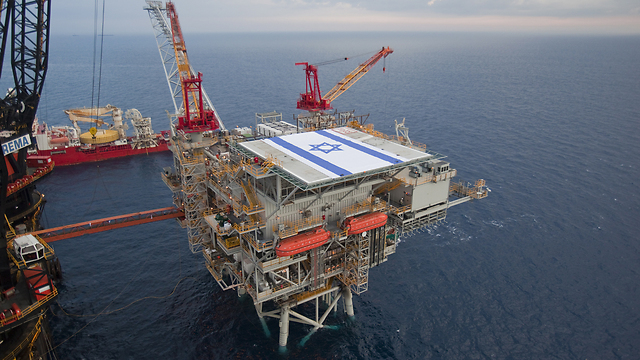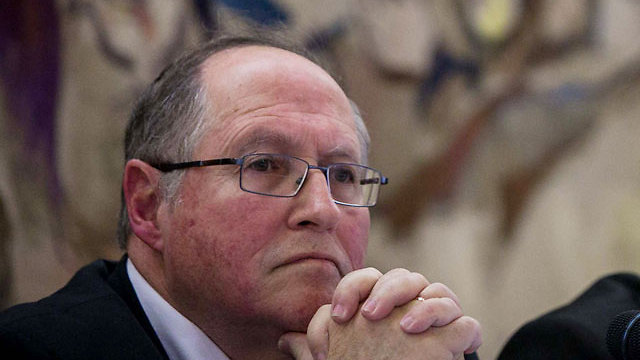
High Court rejects Israel's natural gas plan
The gas deal signed by Prime Minister Benjamin Netanyahu last December with US and Israeli gas companies to develop Israel's offshore gas deposits is rejected by High Court on the grounds that the 'stability clause' is unconstitutional.
Israel’s High Court rejected Sunday afternoon Israel’s natural gas plan which Prime Minister Benjamin Netanyahu signed last December with US and Israeli gas companies to develop Israel's offshore gas deposits.
The judges rejected the “stability clause”, and since it is a prerequisite for the plan – the whole plan was thus rejected. The stability clause was supposed to allow the government or the Knesset to not change the plan for a period of ten years. It was meant to serve as protection from regulatory changes in taxation, antitrust limitations and export quotas. With the exception of Noam Solberg, four of the five justices ruled that the stablity clause was illegal.
Nevertheless, the state was given a period of one year during which it could fix any problematic aspects of the deal. At the end of that period of time, if a deal is not worked out, the plan will be cancelled.
Deputy Supreme Court president Elyakim Rubinstein wrote: "The stability clause in this chapter of the plan, in which the government undertakes for a decade to not only not legislate but to also fight any legislation against the plan’s provisions, was determined without authority – and as such is rejected. It was determined in contrast to the general principle of administrative law regarding the prohibition of shackling the authority’s ability to judge. The government does not have the power to decide not to decide and not to act."
Rubinstein added that this was especially the case when the government seeks to limit the judgment of the next government, "whose composition and ideology will be different than this one." Rubinstein also stated that the stability clause substantially binds the Knesset’s ability to use its discretion.
The decision is a blow to Netanyahu’s stature, who for over a long period went to great pains to get the plan signed. Among other things, he showed up at the the High Court’s hearing on the subject and at one point even said, "You know me - when I want something, I get it.”
Netanyahu responded to the ruling by saying that "the court's decision seriously threatens the development of gas reserves of the State of Israel. Israel is seen as a state in which excessive judicial intervention makes it difficult to do business with."
Netanyahu tried to dampen the joy over the plans rejection adding that "of course nobody should be celebrating the fact that the gas may remain in the depths of the sea and hundreds of billions will not be distributed to Israeli citizens. We will search for other ways to overcome the severe damage caused to the Israeli economy following this surprising ruling."
The case was brought to the High Court by a host of organizations, including Movement for the Quality of Government, The Israel Union for Environmental Defense, and the Labor and Meretz parties. The main arguments of the petitioners were against the decision-making process and the bypassing of the antitrust commissioner and the plan itself - the fact that the state has undertaken not to change it for ten years. The climax of the hearings occurred when Netanyahu came to the High Court in an attempt to persuade the judges to approve the plan. This is apparently the first time in the history of the High Court that a sitting prime minister came to defend the state's position before the Court as opposed to government prosecutors.
Israel announced the discovery of sizeable offshore natural gas deposits about five years ago, and a partnership made up of Israeli and US companies began extracting gas.
After the antitrust commissioner determined last year that the gas companies' ownership constituted a monopoly, a government committee reached a deal with the firms to break up their control and introduce competition.
Netanyahu received the Economy Ministry and the authority to sign the deal after a series of resignations and moves that removed all of the deal's opponents from the way. Anti-trust commissioner David Gilo opposed the deal and resigned even before the plan was completed. Then-economy minister Aryeh Deri, who was asked to sign a clause bypassing the anti-regulator's authority, refused and resigned as well, leaving the Economy Ministry back in the prime minister's hands.
Israel's Delek and Texas-based Noble Energy, which own a number of recently discovered gas fields that supply factories and Israel's electric company, own Israel's largest natural gas field, Leviathan.












